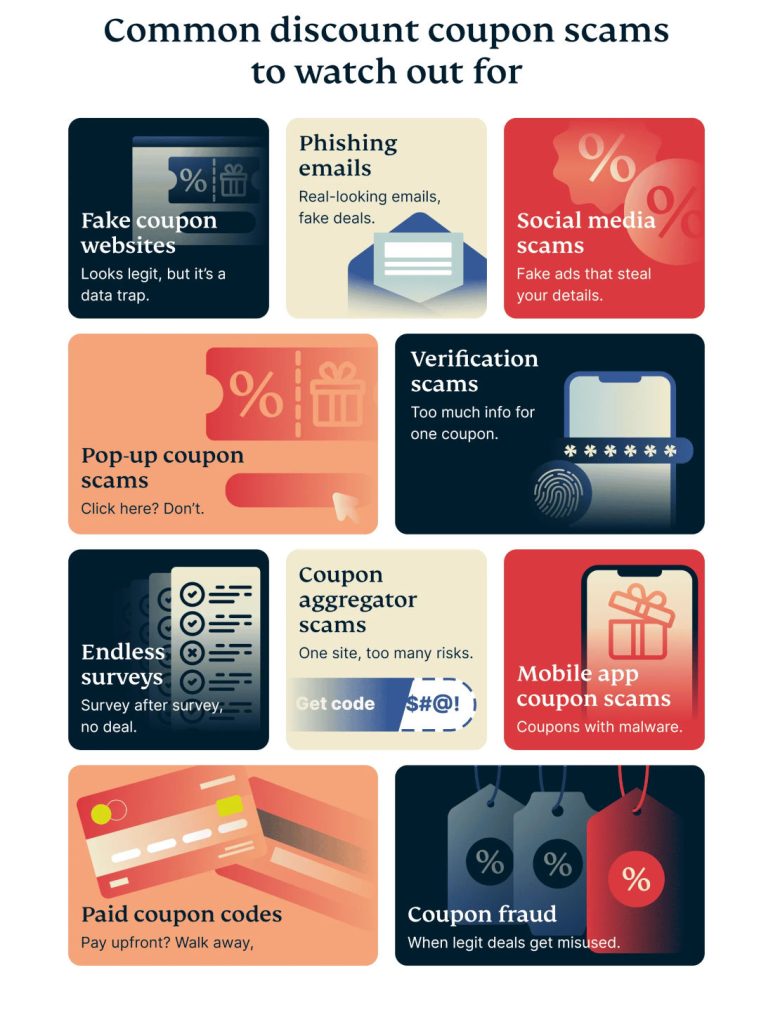
Black Friday and Cyber Monday mark the official kickoff to the holiday shopping season, a time of year synonymous with deep discounts and incredible deals. However, amidst the shopping frenzy, it’s crucial to stay vigilant against the surge in coupon scams that prey on unsuspecting consumers.
According to ExpressVPN’s blog post, you can follow several tips to navigate the Black Friday and Cyber Monday shopping landscape safely. We’ll delve into the various types of coupon scams you might encounter, expose the tactics scammers employ, and provide actionable tips to ensure you score genuine discounts without falling victim to fraud.
A Guide to Avoiding Coupon Scams

Spotting Fake Coupon Sites
Beware of websites offering unrealistically high discounts, such as “60% off at your favorite store.” These fake coupon sites often mimic legitimate platforms but aim to steal your personal information. They might require you to sign up or fill out forms, but instead of providing a coupon, they’re phishing for your data. These sites can look professional and mimic popular brands, making them difficult to spot at first.
Phishing Emails
During the holiday season, your inbox is likely filled with coupon offers. Be cautious of phishing emails disguised as legitimate deals. Clicking on links in these emails can lead to malicious websites or malware. These scams are often well-crafted and can deceive even experienced shoppers.
Beware of Social Media Scams
Social media platforms are flooded with discount deals during Black Friday and Cyber Monday. While some offers are genuine, others are scams. Fake ads can redirect you to fraudulent websites designed to steal your personal information or sell you fake products. Remember the Costco coupon scam? People were tricked by a fake 75 USD coupon on Facebook and lost their data.
Avoid Online Shopping Pop-Up Scams
While browsing online stores, you might encounter pop-ups offering significant discounts. However, these pop-ups are often scams. They can redirect you to malicious websites or infect your device with malware. Be cautious and avoid clicking on these pop-ups.
Protect Your Data from Coupon Verification Scams
Be wary of websites that demand “verification” before you can redeem a coupon. This often involves providing personal details or downloading apps. These are common tactics used by scammers to steal your data or infect your device. Legitimate coupons typically don’t require such extra steps. If a website asks for personal information or app downloads, avoid it.
Don’t Fall for Survey Scams
Surveys promising quick rewards often turn out to be scams. They collect personal information without delivering on their promises. Once you share your details, they can be used for malicious purposes like identity theft or sold to third parties. Avoid these deceptive surveys and focus on legitimate coupon sources.
Beware of Fake Coupon Aggregators
Fake coupon aggregator websites promise to provide convenient access to the best deals. However, these platforms often lead to fraudulent websites designed to steal your personal information. Always verify the legitimacy of the website and avoid entering personal information on unfamiliar platforms.
Avoid Malware-Infected Coupon Apps
Downloading apps that promise exclusive coupons might seem tempting, but some contain malware. These apps can track your activity, steal your personal information, or infect your device. Be cautious when downloading apps and research their developers before installing.
Premium Coupon Scams: Avoid Paying Upfront
Scammers offer “premium” coupons that require upfront payment. They promise exclusive discounts, but once you pay, the coupon and the scammer disappear. Remember, legitimate coupons are always free. Any offer that asks for payment upfront is likely a scam.
Coupon Abuse: How Misuse Impacts Everyone
While scammers pose a threat, coupon abuse is another issue. Some shoppers misuse legitimate coupons, either by using them multiple times or sharing exclusive codes. This practice harms businesses and can lead to stricter coupon policies, making it harder for everyone to find good deals.
Additional Tips for Safe Coupon Shopping
- Use Secure Networks: Avoid using public Wi-Fi for online shopping, as it can be less secure.
- Check URLs Carefully: Ensure the website’s URL is correct and matches the legitimate retailer’s domain.
- Look for HTTPS: Websites that use HTTPS encryption provide a more secure connection.
- Be Skeptical of Urgent Offers: Scammers often create a sense of urgency to pressure you into making quick decisions.
- Verify Coupon Codes: Before using a coupon, double-check its validity on the retailer’s website.
By following these tips and staying vigilant, you can significantly reduce your risk of falling victim to coupon scams and enjoy a safe and rewarding online shopping experience.
